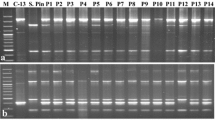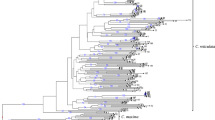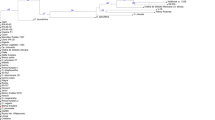Abstract.
Organelle DNA inheritance of four 10-year-old somatic hybrid trees between Valencia orange [Citrus sinensis (L.) Osbeck] and Meiwa kumquat (Fortunella crassifolia Swingle) was analyzed by cleaved amplified polymorphic sequence (CAPS) and restriction fragment length polymorphisms (RFLPs). Five chloroplast (cp) and three mitochondrial (mt) universal primer pairs were amplified, but no polymorphisms were detected. When the polymerase chain reaction products were digested by 15 restriction enzymes, four polymorphic cpDNA-CAPS and two mtDNA-CAPS markers were found. Both the cpDNA and mtDNA in the somatic hybrids were derived from Valencia orange (the embryogenic suspension parent). Genomic DNA of the somatic hybrids and corresponding parents was digested by five restriction endonucleases and hybridized with one chloroplast probe (RbcL-RbcL) and nine mitochondrial probes (coxI, coxII, coxIII, cob, atpA, tyr, proI, atp6 and atp9). The results indicated that three hybrid plants shared one strong cpDNA band with both parents and that the remaining one plant had two additional novel bands besides the shared band, while their mtDNA was identical to that of Valencia orange plus non-parental bands. When data on the mtDNA banding patterns were combined with observations on phenotypic performance in the field, it was found that the more complex mtDNA banding pattern coincided with increased vigor of the plant. The stability of the organelle genomes was studied by extracting the genomic DNA of one hybrid plant at monthly intervals for 1 year and then analyzing it using RFLPs. Before the dieback of the shoots, two fragments of the mtDNA were lost while the cpDNAs remained stable. Ploidy analysis by flow cytometry showed that all of the hybrids were stable tetraploids. Four simple sequence repeat primer pairs were applied to detect microsatellite alleles of the four hybrid plants, both parents and the 12 DNA samples from one plant. The results showed that all hybrids had biparental bands uniformly, which indicated that they had the same nuclear background. These results suggest that the mtDNA pattern is correlated with the phenotypic abnormality of Valencia and kumquat somatic hybrid plants and that nuclear-cytoplasm incompatibility may be the cause of dieback.
Similar content being viewed by others
Author information
Authors and Affiliations
Additional information
Electronic Publication
Rights and permissions
About this article
Cite this article
Cheng, .Y., Guo, .W. & Deng, .X. Molecular characterization of cytoplasmic and nuclear genomes in phenotypically abnormal Valencia orange (Citrus sinensis) + Meiwa kumquat (Fortunella crassifolia) intergeneric somatic hybrids. Plant Cell Rep 21, 445–451 (2003). https://doi.org/10.1007/s00299-002-0532-2
Received:
Revised:
Accepted:
Issue Date:
DOI: https://doi.org/10.1007/s00299-002-0532-2




